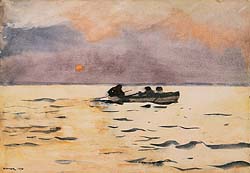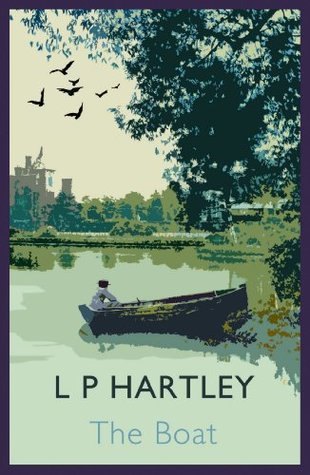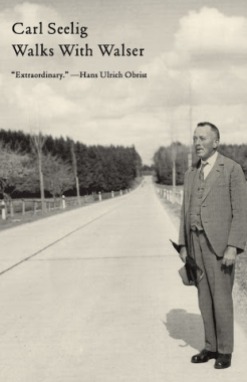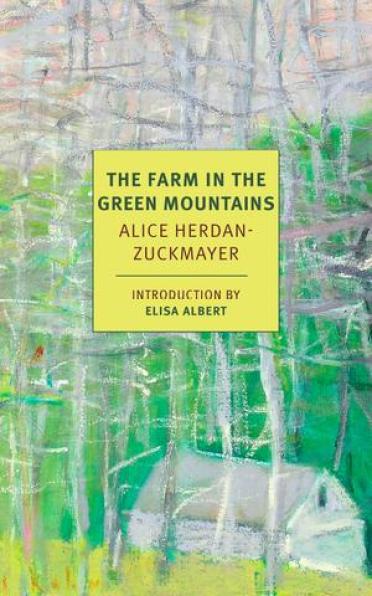Earlier this summer, based on some conversations we’d had about my post on The Go-Between, my friend Nat and I decided to read another of L. P. Hartley’s novels. We settled on The Boat (1949). Here’s what the publisher says about it on the back of my edition:
Timothy Casson, a bachelor and a writer, is forced to return from his contented life in Venice to an English village.
Taking a house by the river where he can pursue his passion for rowing, he has to do battle with the locals to overcome his isolation and feelings of incompleteness. This most complex of Hartley’s novels examines the multiple layers of Casson’s relationships with servants, local society and friends.
Over a week or so, Nat and I emailed back and forth about the book. Here’s what we had to say. Warning: spoilers ahead (such as they are).

Mon 8/21 10:50 PM
Nat,
After enjoying The Go-Between so much last year I was really excited to read more of Hartley’s work. And I was even more excited to read him along with you. But I confess I wouldn’t have finished this book if I’d been reading it on my own. It’s long. Really long. 450 pp in now-I-am-getting-old-and-irritated-with-small-print long. I’m trying to be charitable to the book, but I can’t immediately see why it has to be so long, other than that maybe the end is that much more exciting because we’ve had such a slow build up. The narrative dam bursts, like the river in spate that Timothy finally rides (to disastrous results). But honestly I think I’m being kind here. A lot of this book is just boring.
What I want to know is: how savvy is Hartley about this? It’s pretty clear that he’s set up his protagonist to be dull, a bit muddled, though basically decent. So is the novel’s dullness strategic? Does he want to tell us something about it? I guess the thing that interests me most about the book is that it’s written in 1949 and set in 1940-41 and hardly mentions the war at all. The war is happening, of course (even if at first it’s the “Phony War”) but way off-stage. This seems like a deliberate and almost wilfully anachronistic choice. (After all, this is a time when writers like Green and Bowen and Panter-Downes are writing novels that try to make sense of the war and its aftermath.)
Hartley in fact alludes to his possibly unusual subject matter late in the book (p 397 in my edition), when he ruminates on the war within the war–his war with the local grandees who have blocked the river from “the people” (or, at least, him), which his friends Tyro and Esther are sure to disparage in comparison to the actual war. Where do you think the book’s sympathies are here? Is Timothy right to insist on the importance of his fight? Is it a fight the book believes in? Does Timothy actually believe in it? Or is he just doing it in a last-ditch effort to hold Vera’s attention? In a similar vein, how do you read Timothy’s sleep at the end? A well-deserved rest after many trials and slights? Or a sign of his quiescence/cluelessness?
I think the book likes Timothy–his lack of certainty is better than Magda and definitely Tyro’s blunt convictions (see p 445). He’s a bit of an E. M. Forster muddled liberal type, which I’m not sure the book disapproves of. And often I don’t either. But I’m a bit put off by him too. He doesn’t have the saving qualities of innocence of Leo in The Go-Between.
On another note, is it crazy to think of The Boat as a version of The Mill on the Floss? Actually, I think it is crazy. But the whole boat/flood thing made me wonder. It’s only been a few years since I read MF but I’m embarrassingly hazy on details. Do you know it?
Ok, going to stop now but will flag two things I want to think more about: children, and third person instead of first.
Let me know what you think about what I’ve had to say.
d

Wed 8/23 10:42 AM
Dorian,
I have to agree that this book was a bit of a grind; I was very enthusiastic about your suggestion to read a Hartley novel together, and I thought The Boat sounded like the most interesting option. Coming chronologically between the novels I knew (after the Eustace and Hilda trilogy of the earlier ’40s and before The Go-Between and The Hireling in the ’50s), I was intrigued to see where this novel fit. But it really wasn’t what I was expecting; some Hartley trademarks are there, such as his incisive psychological portraits of character, his exploration of class distinctions, and his occasionally epigrammatic wit (my favourite: “to do a thing badly is an affirmation of independence, whereas to do it well is to confess oneself a slave to other people’s standards”) (181). But there is also a heavy dose of politics, philosophizing, and digressing into the details of English country life. And you’re right; the book is too long by far. Never have I more strongly willed a fictional character to do something than I willed Timothy to get in that boat, which takes him a full 3/4 of the book to do (I imagine that Hartley’s alternative titles for the novel must have been Waiting for the Boat and Much Ado about Boating). The bottom line is that if we do this again (and I hope we do!), I’m letting you choose the book.
This may be just another way of phrasing some of your questions, but I wonder what you make of the central symbol of the boat itself? It’s clear that Timothy has an almost quasi-religious reverence for it, and that it represents freedom and peace for him, but does it mean the same thing to us? Or is Hartley ironically presenting Timothy’s love for boating as a foolish obsession, no different from the fishermen who object to his boat? At the end, Tyro interprets Timothy’s desire as escapism and a death wish; how much credence do we give to that opinion?
I’m tempted to play the Hartley apologist here a little bit; despite many things that I would objectively call flaws in the book (an excessive reliance on letter writing, a significant lack of action, as the main antagonists in the novel hardly ever meet, and when there is action, it is often highly melodramatic and implausible), I still found it strangely compelling. Maybe it’s just what I want to believe, but I do tend to think that Hartley is a bit more savvy than this novel appears to be. He mixes his dull protagonist with characters who belong in a range of different genres; there are the stereotypical servants who actually run the house, the upright but a bit clueless village policeman, and the femme fatale, Vera Cross, who is self-reflexively positioned in this role through the bad noir fiction that Edgell Purbright convinces Timothy to read. I feel like we are supposed to hope that Timothy can find his place in his adoptive village amongst this assortment of figures, but that Hartley is perhaps suggesting the generic and political confusion of a heteroglot England. His hero can’t find a place in this world because it doesn’t quite make sense in itself.
I’m not sure that this playing with genres ever fully works, though; take, for example, the melodramatic scene in which Timothy accidentally stumbles across the secret of Desiree Lampard’s birth and has to decide whether to use this information to prevent her upcoming wedding. Here, Timothy plays a highly conventional role, and one rather expects Hartley to return to this with some kind of twist, but instead, these characters simply fade from view.
Similarly, it seems as if the reader is supposed to be intrigued (and titillated?) by the fact that Vera Cross seems to take a romantic interest in Timothy (who is twice her age) but the explanation of this as being politically motivated is both underwhelming and implausible (she spends over a year cultivating this relationship just to try to get him to do something that would annoy the village elites?). On another note, what is with impossibly idealized women being called Miss Cross? Thinking of Wes Anderson’s Rushmore, of course. On that note, I wonder what you think of Hartley’s treatment of his female characters in general? There is the painfully obvious angel/temptress opposition at work between Mrs. Purbright and Miss Cross, but is Hartley challenging this with his self-aware treatment of these types?
Your question about the war really gets at what I thought was most interesting about the book, but again, not quite interesting in a thoroughly satisfying way. I don’t know nearly enough about post-war British fiction to compare it to the other authors you mention, but on a personal level, having had a grandfather in the RAF and a grandmother who was evacuated from London during the blitz, I had always had a very homogenous idea of Britain being a united nation during the war. Hartley provides a vision of an England still very much divided along class lines, with highly politicized factions at work. It certainly wasn’t what I expected (a communist plot in little Upton?) although maybe my lack of familiarity with the period is showing here. Are there other books you can think of that deal with the role of communism/political dissent in England at this time?
As for the war itself, I thought myself pretty clever for tracing the outlines of an allegorical relationship between the larger events of the war referred to throughout the novel, and Timothy’s personal struggle. But then, Hartley has Timothy (on page 361) pretty much declare the allegorical significance of his actions. So much for being subtle. Again, I’m not sure how well the allegory holds together, but at the very least, we see Timothy moving from a Chamberlain-like stance of appeasement in which he believes that if he plays the game and ingratiates himself with the ruling elite, he will be allowed to use his boat, towards a more militaristic Churchill-like position in which he openly defies them and gives a revolutionary speech to the gathered masses. On the one hand, then, Timothy is England, learning that he can only get the freedom he desires if he stands up for himself. On the other hand, though, there are many ways in which he does not embody Englishness in this context; he is the outsider, invading the space of the landed elites (all ex-military officers) and the driving force behind his boat trip is Vera, who is using Timothy to antagonize these elites.
One can’t help but feel that Hartley is expressing sympathy for Timothy’s revolutionary action (after so much failure, taking the boat out on the water and giving a rousing speech seem like great successes) but if that’s the case, what do we make of the fact that he is, in the end, seduced by the elites and eventually flees? His near-death experience seems to change his attitude towards life in general, but is it really a change for the better, or is he simply allowing himself to be deceived by their promises yet again?
The elites are depicted as dinosaurs who need to be replaced, but Timothy doesn’t want to do this; he just wants to be able to use his boat. I agree that the novel likes Timothy, but the ending seems like yet another in a series of anti-climaxes; he leaves town and falls asleep, flanked by his two very different friends. Is this an image of a new England in which the old order (Esther) and a new modern cynicism (Tyro) unite to save Timothy, the sort of English everyman? That might be the most positive reading I can muster. On the other hand, Timothy is still blaming himself for what has happened to Vera and Mrs. Purbright when he conveniently falls asleep; is this another form of escapism?
I hadn’t thought about the connections to The Mill on the Floss, but it could certainly be said that Maggie Tulliver and Timothy Casson are both figures who repress their strong desires out of consideration for others, and both endure a flood that overpowers the arbitrary limitations of social convention with the force of nature (and, perhaps, a Freudian return of the repressed). I’m not sure how far I would go with the parallel, though, given the gender differences that inform this repression (Maggie is a young girl, relatively powerless with respect to Victorian gender norms, while Timothy is an old man in a relatively privileged position who often creates his own obstacles). Also, the flood in The Mill on the Floss has a redemptive quality to it, which is perhaps more ambiguous in The Boat; does the near-death experience really change anything for Timothy?
Your final questions put me in mind of what I really like about Hartley. For one thing, he is very good at depicting the minds of children. This is what makes The Go-Between and The Shrimp and the Anemone so fantastic. We get glimpses of that in The Boat, with the two evacuee boys who are interestingly doubled at the end by the two boys who join Timothy in the boat, but these figures are never really developed very far. The one moment that stands out for me is when Billy drops his teacup in the drawing room, which instead of being a disaster, causes all the social restraints in the room to be dropped; children are in this sense aligned with a natural rather than social way of life. In this respect, we might also want to talk about Felix the dog, who seems to play a similar role?
Finally, and most tentatively, what I really like about Hartley is his ability to explore the relationship between self and other, how the self can find a place in a world that it necessarily experiences as foreign and other. It seems to me that this almost requires the use of third person, an “other” outside the self-other relationship who is able to witness, describe and analyze it. In The Go-Between, first person works because the narrator is already “other” to himself through the passage of time. I don’t think anything else I’ve read by Hartley has used first person. But that’s just a theory; feel free to explode it.
Sorry, that was long, but you asked so many very good questions. I guess the big question that I’m left with is whether Hartley is sympathizing with the revolutionary politics that is implicit (and often explicit) within the narrative trajectory of the novel, or whether he, like Timothy, would prefer to hold an aesthetic view of the world and simply leave the politics behind?
Nat

Sat 8/26 4:40 PM
Nat,
Great question: does Hartley sympathize with the revolutionary politics referred to both implicitly and explicitly in the novel?
I would have to say, No. There’s just too much bathos for me at least to think he wants us to take it seriously. After all, isn’t Vera a bad character? She gets Mrs. Purbright killed. She leads Timothy on, and is really quite cruel to him. We’re clearly supposed to dislike her. So how can we take her crusade seriously? And what the hell kind of crusade is it anyway? Opening up the river to boating just seems extraordinary small potatoes–not even worthy as a symbol. Now, I suppose a lot does depend on whether you think she did indeed seduce Timothy only to insist he imagined it, or whether he has in fact imagined it. Where are you on that? I think it’s the former. But if it is the latter, then we would have to see Vera in at least a somewhat different light. It would have the benefit of making Timothy even more ambivalent–pathetic at best, sinister at worst. I guess looking back on it I’m really confused about Vera’s motives. She’s like a super-low-rent Mephistopheles: just doing something bad/unpleasant (not sure it quite rises to evil) just because she can.
I like what you’re saying about the third person (or a retrospective first person) as a requirement for the self-other investigation you prize in Hartley. But in that case, why attach the third person so closely to a single character? Wouldn’t a more roving, omniscient-minded narrative voice be able to do that work more fully? If we got insider other people’s heads, we might get a better overview of English society–in other words, the political element of the novel would be strengthened, or at least that’s the way I see it.
It’s a great question as to whether there are other books about the role of communist/political dissent in the period. There must be but I can’t think of anything. Bowen’s Heat of the Day (a masterpiece) is certainly about dissent–but of a fascist rather than communist sort. Bits of Lessing’s The Golden Notebook are critical of English communism, but that’s in reference to the 50s–the debates over Stalinism etc. Maybe others can help us out here. But I think we are agreed that the most interesting thing about the book is the way it addresses the class ambivalences of war-time England (thereby contesting the “we’re all in it together” myth).
You’ve helped me see that The Mill on the Floss comparison isn’t very fruitful. Eliot is a lot more progressive than Hartley. And she cares about women, which, based on the two novels I’ve read, I can’t say Hartley does. At least the women in The Go-Between have the fascination of monstrousness about them. Vera never quite rises to that level.
I’m starting to think of the book as more and more conservative. Perhaps Hartley belongs with other English writers who despaired of what they saw as the spiritual impoverishment of postwar life (often because the privileges of their own classes were being taxed away): Evelyn Waugh, late Henry Green (certainly true in his letters and such; in his early work, in particular, he is much more nuanced about such matters). I should read some more Hartley to find out, but for the time being I need to take a bit of a break from him…
Totally agree with your points about the children–I wanted more of both sets of them. And the dog’s maybe the best character in the book. Who was it said never to act with children and animals? Timothy should have known better…
What other things do we need to talk about?
d

Mon 8/29 12:39 PM
Dorian,
Yes, I absolutely agree that we are supposed to dislike Vera and that the revelation of her motives is just about the weakest part of the book. I like your characterization of her as a “super low-rent Mephistopheles” but even more than that the disparity between her rather minimal objective and the amount of effort she puts into achieving it (cultivating a relationship with Timothy, whom she is revealed not to like very much, over the course of something like two years) just seems laughably implausible. As for whether Timothy has imagined his seduction by Vera, it’s a tempting theory, but Hartley doesn’t really seem to have done anything to get us to doubt Timothy’s reliability (which would have actually made things a lot more interesting, I think). In fact, when I was about 2/3 of the way through the book, and it didn’t seem to me that Hartley could possibly end things in a satisfactory way, I actually found myself hoping that Vera would turn out not to exist at all, but be some kind of psychological projection of Timothy’s. No such luck, but even that would have made more sense than what we got.
But if we don’t like Vera, surely we don’t much like the representatives of the established order either? Aren’t we hugely disappointed at the end when Timothy goes to Colonel Harbord’s party and is seduced by the beauty of his lawn? Would it be possible to make the case that Hartley is advocating for some kind of liberal “middle way” between the uptight old order and the flaky young revolutionaries? Timothy fails to find such a way, being pulled back and forth between the two camps, but perhaps this is what Hartley wants his readers to strive for? Interesting that you conclude that he is being ultimately conservative, and I can certainly see that argument, but is it simply for the lack of any reasonable alternative? Is he, to invoke the Arnoldian cliché, caught “between two worlds, one dead, the other powerless to be born”?
Good point about Hartley’s narrative being so chained to Timothy’s consciousness that it’s not all that different from a first-person narrative. The exception that proves the rule is that the sequence of chapters that is probably the most effective in the novel is (I think) the only time where the narrative strays from Timothy’s side for any length of time. Just as we are anxious to learn whether Timothy’s project of taking the boat out is to be accomplished, Chapter 28 takes us to the Rector’s house, where Mrs. Purbright makes the decision to try to warn Timothy about the high water, then Chapter 29 reveals how Vera came to arrive at just the same spot on the riverbank as Mrs. Purbright. This helps to build suspense about what is going to happen to Timothy, and then that chapter ends with uncertainty about what has happened to Vera and Mrs. Purbright, which builds more suspense as we return to Timothy and the boat in the following chapter. Hartley is at his best in this sequence, and the rest of the novel really does suffer from being so confined to Timothy’s point of view. On the other hand, part of Hartley’s point is that Timothy doesn’t really know how the other Uptonians feel about him, and perhaps if the reader did know, it would take away from the incessant anxiety he feels about how is being perceived by others. I suspect the feeling of unease that Timothy feels would be difficult to sustain with a more free-flowing omniscient narrator. (But still, your point about needing other perspectives is spot on.)
And yes, the dog probably is the best character in the book and Hartley’s genius can be seen in how he captures the essence of dogs in one sentence: “He seemed to know at once where he wanted to go and to think it did not matter what happened to his body, provided his head got there.” Also, probably the best comic sequence in the novel is the servants’ efforts to convince Timothy that he needs a dog. After deciding that he needs a companion who can speak a foreign language, Wimbush in his roundabout way tells Timothy, “A dog, now, he speaks what you might almost call a foreign language.” I found it funny, but such sequences also add to the generic inconsistency of the novel; what exactly is it trying to be?
I think we may have just about exhausted the novel, but one last thing I was thinking about was the role of Italy. Timothy comes back to England after years of living in Venice, which establishes his “foreignness” in Upton, but does this code him as somehow suspicious (he seems to prefer many Italian values and customs to English ones) or refreshingly cosmopolitan and worldly? Esther expresses the quintessential Anglo-centric world view in an early letter: “I don’t see how another country can really disagree with England, for England is every country’s other self” but on the whole, it always seems that Timothy would rather be in Italy. Is he an escapist who has been forced by the war to confront his own country? And is the bottom line that he lacks the ability to deal with living in England? And if so, is that more of a reflection on him or on the country itself?
Nat

Tues 8:29 9:43 PM
Nat,
Was I ever disappointed in Timothy for falling in love with that lawn! The middle-way theory makes so much sense, but what does it mean that the novel can’t seem to imagine it? A similar throwing up of the hands might be at work in the novel’s portrayal of Italy. I’m glad you brought that up, as I was thinking about it too. His love of Italy makes Timothy a bit more worldly, less parochial. (and it’s another way he was reminding me of Forster.) But he’s unwilling to cut Italy too much slack–rightly decrying its turn to fascism. (Does it make a difference, I wonder, that he is the only character with any direct experience of fascism? Unlike his much more political friends.) Mostly Italy seems to function as a lost paradise–it’s like a synonym for the youth and vigour he no longer has. So in the end I don’t know that it much matters that it is Italy, just that it’s a place he felt himself to have been more free in than his current circumstances. Do you think that’s right?
I agree I think we’ve done about all we can for this novel. If anybody is inclined to pick it up after our exchange (which frankly I doubt!) I sure would like to hear what they had to say.
Let’s time we’ll go for something different. Or maybe we should push on with Hartley to see whether The Boat is an aberration.
Thanks for talking about it with me–totally enjoyed it!
xo
d
Wed 8/30 12:49 PM
Dorian,
Yes, I think you’re right about Italy. Not only is it his lost paradise, but it was his job as a writer to send back romanticized portraits of Italy to England. That falls apart with the outbreak of war, and Timothy’s attempts to romanticize England in a similar way also fall apart rather quickly. This also adds to the sense of Timothy as an escapist who lacks the tools (or desire) to deal with his real social situation.
I really enjoyed our conversation as well, and only wish we had both enjoyed the book a bit more. Probably best to give Hartley a break for the time being (although I did get my hands on a copy of Facial Justice) but I do look forward to reading something with you again. Perhaps you should choose next time; your judgment in these things is clearly better than mine!
Best,
Nat










